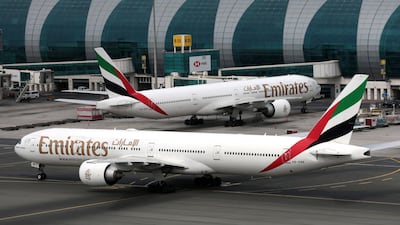Emirates airlines expects to report next month “positive” annual financial results though the pace of growth is slowing because of geopolitical tensions, rising fuel costs and unfavourable currency swings.
The last financial year, which ends March 31, has “not been easy in terms of results”, Emirates president Tim Clark said during the Arabian Travel Market in Dubai.
“We’ve managed to come ahead in terms of a positive result,” he said. “Although it’s not as good as it has been in the past, it’s not a bad positive result.”
Emirates, the world’s biggest long-haul carrier, has embarked on a re-evaluation of its route network and fleet in the last nine months as it deals with a declining pace of growth compared to previous years and the aging out of its flagship Airbus A380 superjumbo in the mid-2030s.
“We haven’t been growing at the pace that we’re used to because of the geopolitical issues in the region and elsewhere,” Mr Clark said. “It’s a good time to take stock of what the network is going to look like in the next 5 or 10 years, what the fleet fit into that network is going to be, and the type of aircraft.”
The airline has been “knocking down the network” during the review to decide the best route types for itself and the emirate of Dubai, according to Mr Clark. It is nearing the of that exercise and has a “fair idea” of its plans for the next 13 years.
Emirates is facing tough operational conditions as oil prices weigh on regional economies and it failed to persuade Airbus to develop the A30 Neo, an upgrade to the existing superjumbo jet, which is the anchor to its super-connector model.

